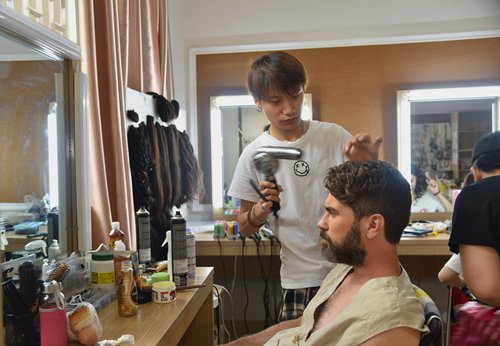Evolving landscape
By Bi Mengying Source:Global Times Published: 2019/7/18 15:28:40
US actor Jonathan Kos-Read talks about his two-decade career in China’s movie industry

Jonathan Kos-Read prepares for a shoot at the Changzheng Hotel in Hengdian, Zhejiang Province, on July 2. Photo: Bi Mengying/GT
I met Jonathan Kos-Read around 6:30 am at the hotel lobby in Hengdian, a small town in east China's Zhejiang Province. Just getting back from Venice, Italy for shooting, he flew back to Hengdian World Studios, China's equal to Hollywood, to shoot for another Chinese TV series. Kos-Read is no stranger to Hengdian. Naming himself in Chinese after the infamous Eastern Han Dynasty (25-220) general Cao Cao, he has appeared in more than 100 Chinese movies and television shows, playing various famous people who have come to China such as Joseph Stillwell and Claire Lee Chennault. He has been in many major blockbusters in the Chinese mainland such as Ip Man 3 and Mojin - The Lost Legend, making him a prolific foreign actor working in the country.
Working hard
Wearing a loose white Chinese-style vest, Kos-Read spoke with the sleepy and raspy voice of someone who just woke up. Having only slept for four hours and most likely pretty jet lagged, he leaned his head against the back of the chair and closed his eyes to rest for a brief moment.
After gulping down some coffee and entering the dressing room, he transformed into this energetic person who interacted with the crew in fluent Chinese. He seemed to bring joy to the dressing room. At the same time, he was meticulous about every detail of the character he was going to play that day.
"I thought about my character. I think he is a very neat person. Everything about him should be in order… I think he would check his beard every morning and trim it. That's the kind of person he is," he said, explaining why he was giving detailed instructions on how he wanted his beard trimmed.
Kos-Read noted that being a foreign actor in China requires one possess a series of characteristics: Looks that match the Chinese idea of a "typical" foreigner, acting skills, the ability to speak Chinese and a certain level of understanding about China and how it works. Last but not least is the willingness to work hard.
"You are gonna work hard. I know a lot of foreigners are like, 'I'm gonna be in the movie. It's cool.' But it's really hard. The work is hard. The lines are hard. You have to memorize the Chinese lines. You have to be really genuinely serious about acting and understanding your character and figuring out what you should look like," Kos-Read added.
Changing stereotypes
"The kind of ideas of what foreigners are like was completely imaginary… Foreigners weren't people. They did all these sorts of things that foreigners do," said Kos-Read, admitting that during the early stage of his career two decades ago most Chinese filmmakers projected their stereotypes of foreigners onto the parts he played. At the time, he was one of a handful of foreigners in the Chinese mainland who were working as full-time actors.
"And the real difference now is that there are so many foreigners in China, especially in Beijing. Where the scripters used to just use their imagination to write about foreigners, now most of them know, or are friends with, one or two foreigners, so they have the same epiphany that most people do when they become closer to people from other countries... So they write foreign characters as people first, and foreigners second, so the scripts are a lot better in terms of the way they write foreigners than they used to be," he said.
Further opportunities
Kos-Read explained that his relationship with China began while he was studying film at New York University, during which time he took a Chinese language course. As he began learning the language, the determination to master it by moving to China took form within him.
"When I came, I figured I'd stay at least two years to get fluent in Chinese. I stayed 10 times longer than that," he said, smiling.
Working as an actor and staying in Beijing much longer than he planned has not been the only surprise over the years. Before the 2008 Beijing Olympic Games, he was invited to host a segment of a Chinese news program called Diqiri (The Seventh Day).
"When I started to do it, I had no idea what a popular show it was. Then immediately people started to recognize me on the street," he recalled.
At one point he became a little worried about being replaced, so he decided to come up with a tagline, capitalizing on the fact that the general he was named after appears in a well-known Chinese saying that is roughly equivalent to "speak of the devil."
"Don't forget, next week. Speaking of Cao Cao, Cao Cao will come. And then my little section, the name of it became Cao Cao Lai Le [Cao Cao Arrives]. And then what they are going to do, I mean they can't, [change it to something] like Carl Lai Le, or John Lai Le. It would be more trouble to replace me than it's worth," he said, laughing.
More roles in films and TV and opportunities to host travel shows came his way, filling his life with adventure. Combined with his passion for photography, he has traveled to more than 150 cities across the country.
"Coming to China, learning Chinese, when I was whatever, 21, 22 years old, and coming to Beijing, becoming an actor here, living here for 25 years, starting a family here... It's one of the greatest choices of my life. Because I made that decision one night, flipping through a course book, I have this just fantastically fun and interesting life that I wouldn't have otherwise," he said.